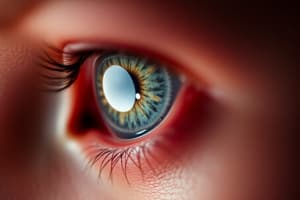Podcast
Questions and Answers
What is the primary function of rods in the retina?
What is the primary function of rods in the retina?
- Spatial awareness in daylight
- Color vision in bright light
- Detection of fine detail
- Vision at low light levels (correct)
Which theory of color vision suggests that humans perceive color through three primary colors?
Which theory of color vision suggests that humans perceive color through three primary colors?
- Opponent process theory
- Trichromatic theory (correct)
- Complementary color theory
- Retinex theory
What area of the retina is densely populated with photoreceptors, particularly cones?
What area of the retina is densely populated with photoreceptors, particularly cones?
- Optic nerve
- Fovea (correct)
- Peripheral retina
- Macula lutea
What characteristic is associated with color blindness?
What characteristic is associated with color blindness?
What does the concept of perceptual set refer to?
What does the concept of perceptual set refer to?
What is the role of perception in the sensory process?
What is the role of perception in the sensory process?
Which term refers to the minimum stimulation required to detect a particular stimulus?
Which term refers to the minimum stimulation required to detect a particular stimulus?
Where does light enter the eye?
Where does light enter the eye?
What is subliminal stimulation?
What is subliminal stimulation?
What structure of the eye helps regulate the amount of light entering?
What structure of the eye helps regulate the amount of light entering?
What part of the brain processes and interprets visual information?
What part of the brain processes and interprets visual information?
What is the term for the area on the retina where there are no photoreceptor cells?
What is the term for the area on the retina where there are no photoreceptor cells?
Which structure of the eye is responsible for focusing light rays on the retina?
Which structure of the eye is responsible for focusing light rays on the retina?
Study Notes
Sensation and Perception
- Sensation refers to the stimulation of our sense organs (touch, smell, sight, taste, sound).
- Perception involves the selection, organization, and interpretation of sensory input, allowing us to consciously recognize objects.
- Psychophysics studies how physical stimuli are translated into psychological experiences.
- Threshold represents the dividing point between energy levels that have a detectable effect and those that don't.
Absolute Threshold
- The absolute threshold is the minimum stimulation needed to detect a particular stimulus (taste, light, sound, odor).
- It's the lowest level at which a stimulus can be detected by our senses, meaning we can perceive it at least 50% of the time.
- Stimuli detected less than 50% of the time are considered subliminal.
Vision
- Light enters the eye through the cornea, then passes through the pupil.
- The iris controls the amount of light entering by dilating or constricting in response to light intensity and even emotions.
- The lens focuses light rays onto the retina.
- The retina, a neural tissue lining the back of the eye, absorbs light, processes images, and sends visual information to the brain.
- It contains photoreceptor cells, responsible for detecting light and converting it into neural signals.
Visual Processing
- The visual cortex in the occipital lobe processes and interprets visual information received from the optic nerve.
- The blind spot is an area on the retina lacking photoreceptor cells, resulting in a small region where we can't perceive incoming light.
- Optic nerves are comprised of millions of nerve fibers that transmit visual messages to the brain, allowing us to see.
Photoreceptor Cells
- Rods, more sensitive to light, are responsible for vision in low light conditions, night vision, and peripheral vision.
- Cones are responsible for color vision and fine detail. They're concentrated in the macula, an area in the center of the retina containing about 6 million cones.
- The fovea is an area within the macula densely packed with photoreceptors.
Color Perception
- Trichromatic theory proposes that human eyes perceive only three colors of light: red, blue, and green, and that all other colors can be produced by combining these.
- Opponent process theory explains color perception as being controlled by two opponent systems: a blue-yellow mechanism and a red-green mechanism, where one member of the pair suppresses the other color. This theory helps explain afterimages.
Color "Blindness"
- Color "blindness" refers to a deficiency in the brain's ability to distinguish colors. It affects more males than females.
Perceptual Set
- Perceptual set is a mental predisposition to perceive stimuli in a particular way based on previous experiences, expectations, beliefs, and context.
Studying That Suits You
Use AI to generate personalized quizzes and flashcards to suit your learning preferences.
Related Documents
Description
This quiz explores the concepts of sensation and perception, including the physiological processes involved in detecting stimuli and interpreting sensory information. Key topics include absolute thresholds, psychophysics, and the role of the eye in vision. Test your understanding of how we perceive the world around us.


